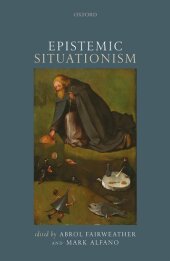 Neuerscheinungen 2017Stand: 2020-02-01 |
Schnellsuche
ISBN/Stichwort/Autor
|
Herderstraße 10
10625 Berlin
Tel.: 030 315 714 16
Fax 030 315 714 14
info@buchspektrum.de |

Mark Alfano, Abrol Fairweather
(Beteiligte)
Epistemic Situationism
Herausgegeben von Fairweather, Abrol; Alfano, Mark
2017. 272 S. 241 mm
Verlag/Jahr: OXFORD UNIVERSITY PRESS; OUP OXFORD 2017
ISBN: 0-19-968823-0 (0199688230)
Neue ISBN: 978-0-19-968823-4 (9780199688234)
Preis und Lieferzeit: Bitte klicken
This is the first sustained examination of epistemic situationism. Many philosophers explain knowledge in terms of epistemic virtues and vices. But psychological research suggests that environmental variables have greater explanatory power than character traits. The problem is addressed here from both sceptical and conservative viewpoints.
This volume is the first sustained examination of epistemic situationism: the clash between virtue epistemology and the situationist hypothesis inspired by research in empirical psychology. Situationism began as a challenge to the psychology of character traits, targeting ethical theories that presuppose a trait psychology. Psychological research suggests that (often trivial) environmental variables have greater explanatory power than character traits. Epistemology
pursues questions about the nature of knowledge. While there are internal differences within virtue epistemology between responsibilists and reliabilists, they all analyze knowledge in terms of epistemic virtues and vices. However, despite promising normative results, virtue epistemology appears to
assume the same character-based psychology as virtue ethics does.
Until recently, virtue epistemology and situationism were separate literatures, but philosophers have begun to examine the apparent incompatibility between situationist psychology and virtue epistemology. Much of the psychological research that raises questions about the empirical adequacy of the moral psychology of virtue ethics also appears to raise doubts about the empirical adequacy of the epistemic psychology assumed by virtue epistemology. Responsibilist virtue epistemology appears
particularly vulnerable because epistemic virtues like open mindedness, conscientiousness and intellectual courage are traits of intellectual character, but reliabilist virtue epistemology appeals to the psychology of cognitive skills, abilities, and competences that may be similarly vulnerable. The essays
in this volume take up this new problem of epistemic situationism from multiple points of view - some sceptical or revisionary, others conservative.
Abrol Fairweather is a lecturer in the philosophy department at San Francisco State University. He received his Ph.D. from the University of California, Santa Barbara. In addition to multiple articles, Abrol has edited four collections of papers related to virtue epistemology and intellectual virtue, including Naturalizing Epistemic Virtue (CUP, 2014) with Owen Flanagan. His forthcoming book Knowledge and Dexterity (CUP, 2016) is co-authored with
Carlos Montemayor and defends a theory epistemic agency utilizing recent research in the psychology of attention.
Mark Alfano is associate professor of philosophy at Delft University of Technology. He received a doctorate from the Philosophy Program of the City University of New York Graduate Center (CUNY GC) in 2011, and he has been a postdoctoral fellow at the Notre Dame Institute for Advanced Study and the Princeton University Center for Human Values, as well as assistant professor of philosophy at the University of Oregon.
Mark works on moral psychology, broadly construed to include ethics, epistemology, philosophy of mind, and philosophy of psychology. He also maintains an interest in Nietzsche, focusing on Nietzsche´s psychological views.


